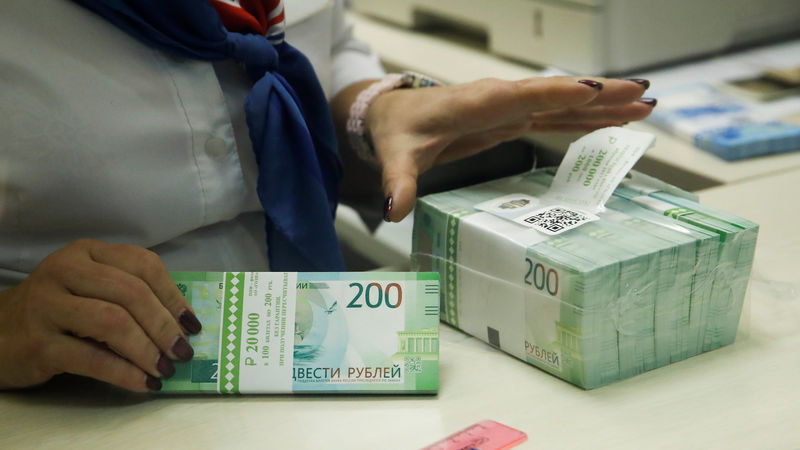MOSCOW (Reuters) - The rouble eased on Wednesday alongside other emerging market currencies after ratings agency Moody's sounded more alarm about the Turkish banking sector, outweighing the positive impact of Russian president Vladimir Putin's pension reform.
Putin said he has decided to dilute unpopular draft legislation to reform the pension system which has hurt his popularity, but said serious demographic challenges meant some kind of reform was necessary.
By 1215 GMT, the rouble was down 0.3 percent to 68.07 against the dollar
"Investors estimated the softening of the pension reform as a reduction of domestic political risks," said Kirill Tremasov, the former head of the economy ministry's macroeconomic forecasting department and now head of research at Loko-Invest.
Against the euro, the rouble fell lost 0.06 percent to 79.40
Analysts at Rosbank, a subsidiary of Societe Generale (PA:SOGN), said in a note that market players were buying dollars whenever there was no specific and important news to dictate otherwise.
Geopolitical concerns were a persistent pressure and the rouble was suffering from mounting global risk aversion, analysts said.
U.S. sanctions against Russia, tied to a nerve agent attack in Britain, came into effect on Monday and a second batch of penalties could be imposed after 90 days.
The rouble has also now lost support from month-end tax payments, and the foreign currency sales by exporters is seen running out of steam, VTB Capital analysts said.
Exporters usually convert their foreign currency revenues in order to meet local tax duties that fall in the second half of every month.
However, the rouble did glean some support from higher oil prices, and Russian stock indexes rose.
Brent crude oil (LCOc1), a global benchmark for Russia's main export, was up 0.59 percent at $76.40 a barrel.
The dollar-denominated RTS index (IRTS) was up 0.26 percent to 1,081.05 points. The rouble-based MOEX Russian index (IMOEX) was 0.87 percent higher at 2,336.45 points, after hitting its highest level since July 16 at 2,239.72.
"Probably, the general undervaluation of our market on the back of a record high oil price in roubles supports a stable demand for Russian shares from many investors," BCS brokerage analysts wrote in a note.
For Russian equities guide see
For Russian treasury bonds see <0#RUTSY=MM>
